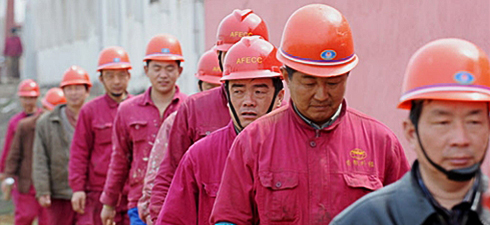While China’s inroads into Africa and Latin America have been primarily about procuring natural resources, Chinese companies are now targeting large-scale infrastructure projects in Europe. In tandem with those big contracts, they are increasingly buying political clout in Europe and even contending with the International Monetary Fund (IMF), which as a rule ties aid loans to consolidation of the borrowers’ national budgets.
Chinese state-owned corporations are assailing Europe from its outskirts: to wit, the government in Beijing has just clinched so-called strategic agreements with Moldova and Serbia. Under the arrangement with Moldova, China will grant the country a $1 billion soft loan in return for enormous building contracts to be awarded to the China Overseas Engineering Group (Covec), its largest construction group.
Taiwan and Kosovo at heart of Sino-Serb deal
China has already shelled out billions in development aid to Africa, Asia and Latin America to buy access to natural resources and big infrastructure projects there. Development aid policymakers decry that strategy as “Chinese neo-colonialism”, chiefly because, by lending money without any mandatory reform strings attached, Beijing is blatantly disregarding the urgent need for economic and social change in those countries, say many Western politicians. Instead of reforms, countries like Macedonia and Costa Rica have had to break off relations with Taiwan in exchange for Chinese aid.
Europe is the latest target of Chinese expansionism. Now that the Serb and Chinese presidents Boris Tadic and Hu Jintao have signed a strategic cooperation agreement, the two nations are negotiating a Chinese “soft loan” for the building of a bridge across the Danube and roads to the tune of €200 million, plus harbour extension projects, the development of special economic zones, and even defence projects. Under the terms of the cooperation deal, China must refrain from recognising the secessionist Serb province of Kosovo, and Serbia, for its part, from recognising Taiwan, which China still regards as part of its sovereign territory. "China is becoming the pre-eminent power in the world economy, so a strategic partnership with a country like that makes sense,” reasons Tadic. Dušan Prorokovi of Serb ex-premier Vojislav Kostunica’s opposition party, on the other hand, decries the colossal debt Serbia is incurring under the agreement.
Prices that undercut European competition
Over in Poland, Covec is offering dumping rates in their bid to corner the new roadworks market, worth close to €40 billion in the runup to the 2012 EUFA European Football Championship there. Covec have just landed their very first two EU motorway construction contracts – viz. for parts of the new Warsaw-Lodz A2 expressway. The state-owned enterprise out-tendered big-name Western contenders by offering to build the roads at €6.3 to €6.5 million per kilometre, 60 per cent under the bid price and well below the quotes from Poland’s PBG group and Ireland’s SRB Civil Engineering. Since then, Warsaw has been wondering how Covec intend to maintain that price and whether cheap Chinese manpower will be flown in for the job – as for Chinese projects in Africa.
China is hammering out aid loans on easy terms in the neighbouring Ukraine as well, where prime minister Yulia Tymoshenko’s “Fatherland” party is mulling cooperation with China’s Communist party. What is particularly nettlesome about China’s soft loans to Serbia and the Ukraine is that these very countries have signed on for billion-dollar IMF aid programmes, in exchange for which they are to submit sweeping austerity programmes in the national budget.
Volker Perthes, head of a Berlin-based think tank called the German Institute for International and Security Affairs, told the Handelsblatt that “moves like that undermine the IMF”: China is according huge loans “as it did in Africa” without any economically sensible strings attached. And “that makes the work harder for the IMF, the World Bank and Western development aid.”
European Union
China snubs divided Europe
What will be the future of commercial relations between Europe and China? The European press seems resigned to inevitable Middle Kingdom dominance. Zbyněk Petráček in Czech daily Lidové Noviny quips that the archetypal Polish plumber or the pimp hailing from Eastern Europe may soon be stock figures overwhelmed by the ineluctable rise of the Chinese investor. “Only thirty years ago,” he writes, “Made in China was a rarity synonomous with ping-pong balls and pens. Now we know nothing else.” The recent success of a Chinese consortium to develop a Polish motorway from Lodz to Warsaw, he argues, is based on the simple issue of low costs. “If Europeans don’t appreciate this fact, they had better come with something comparable.”
However, this looks unlikely according to The Daily Telegraph’s China correspondent Peter Foster. From a Chinese perspective “Europe is an increasingly divided and enfeebled entity, unable to negotiate with one voice and rapidly being overshadowed by a burgeoning US-China relationship.” Tensions with the EU and human rights and protectionist issues have led China to “focus its dealings on country-to-country negotiations, setting up a strategic economic dialogue with the UK, a status that France and Germany are also now seeking.” Ratification of the Lisbon treaty could well save Europe from becoming marginalised however, with “the creation of a European president and High Representative for foreign affairs.” From a US-China G2, Europe could become a “vital third party in the shaping of a new, multi-polar world.”
Was this article useful? If so we are delighted!
It is freely available because we believe that the right to free and independent information is essential for democracy. But this right is not guaranteed forever, and independence comes at a cost. We need your support in order to continue publishing independent, multilingual news for all Europeans.
Discover our subscription offers and their exclusive benefits and become a member of our community now!












